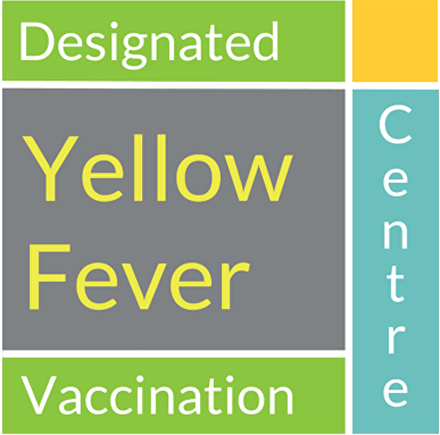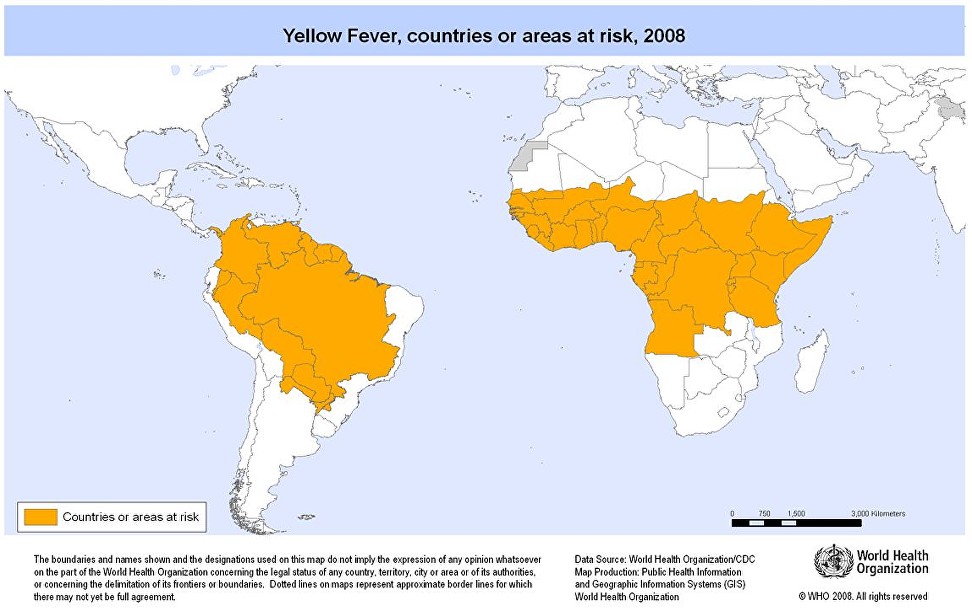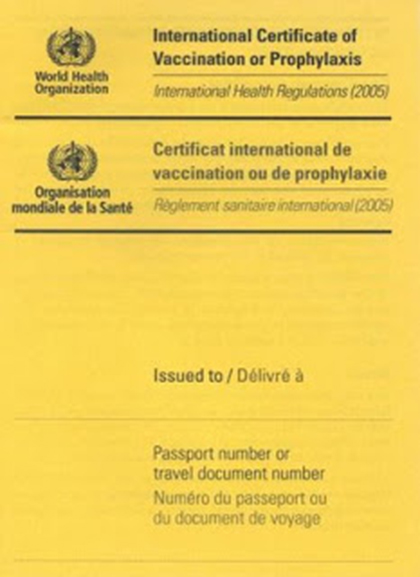
Yellow fever is a serious viral infection that’s spread by a type of daytime biting mosquito known as the Aedes Aegypti mosquito.
It can be prevented with a vaccination.
Yellow fever mainly occurs in sub-Saharan Africa (countries to the south of the Sahara desert), South America and in parts of the Caribbean.
Since 1996, six travellers from Europe and North America have died from the infection. None of them were vaccinated.
Yellow fever carries an 8% risk of death.
It is called “yellow fever” because the infection targets the liver leading to jaundice – yellowing of the skin and the whites of the eyes caused by liver damage.
Yellow Fever, countries at risk

Yellow fever vaccination
There is a vaccination for yellow fever. Some countries require proof of vaccination (a certificate) against yellow fever before they let you enter the country. You should have a yellow fever vaccination at least 10 days before your travel. This will allow enough time for your body to develop protection against the yellow fever infection.The yellow fever vaccination is recommended for anyone travelling to, or living in, areas or countries where yellow fever is a problem, and anyone travelling to a country where an International Certificate of Vaccination against yellow fever is required for entry.
Certificate of proof
You can find a list of all the countries that require you to have an ICVP in the WHO International travel and health guide. You can also search the country information on NaTHNaC to find out whether the places you are visiting require
an ICVP.
If you have been travelling in an “at-risk” area during the past month, it is a good idea to carry your certificate with you. This will help avoid potential problems with immigration. It is possible for travellers without a valid yellow fever vaccination certificate to be vaccinated and held in isolation for up to 10 days. An ICVP is not required for entry into the UK.
If you lose your certificate, you may be able to get another one reissued as long as you have details of the vaccination batch number and the date you had the vaccination.

Cost
Yellow fever vaccine has never been available on the NHS service in the UK. It has always been a vaccine that has needed to be purchased privately.
For cost please visit our “Price” page.
Who should not be vaccinated?
People who should not have the yellow fever vaccination include:
Babies under nine months of age.
Babies who are six to nine months old should only be vaccinated if the risk of getting yellow fever during travel is unavoidable
Pregnant women – unless the risk of yellow fever is unavoidable
Breastfeeding women – unless the risk of yellow fever is unavoidable
People whose immune systems are lowered
(immunosuppressed) – such as people with HIV and those receiving chemotherapy or radiotherapy
People who are allergic to eggs
The vaccine contains small amounts of egg
People who have had a severe allergic reaction
(anaphylaxis) to a previous dose of the yellow fever vaccine
People who are allergic to any of the ingredients in the vaccine
People who have a condition that affects the thymus gland (part of your immune system that is located in your upper chest)
People who are currently very unwell (for example with a high fever) – this is to avoid confusing the diagnosis of your current illness with any side effects from the vaccine
Elderly yellow fever naïve travellers
Those who have not been previously exposed to the vaccine who are 60 years of age or over (unless the risk of yellow fever is unavoidable)
Exemption letters
In cases where having a yellow fever vaccination is not advised, your GP may be able to issue you with an exemption letter. The letter should be written on headed notepaper and include the practice details. It may be accepted by some immigration authorities.
If you are travelling from an area where there is a risk of yellow fever without a valid yellow fever certificate, immigration officials are legally entitled to quarantine you for a period of at least seven days at the point of arrival into a country.
Side effects of the vaccine
After having the yellow fever vaccine, 10-30% of people will have mild side effects such as:
Headache
Muscle pain
Soreness at the injection site
Mild fever
Reactions at the injection site usually occur one to five days after being vaccinated, although other side effects may last for up to two weeks.
Rarely, the yellow fever vaccine is associated with a neurological condition known as yellow fever vaccine-associated neurological disease (YEL-AND). Neurological means that it affects the nervous system, including the brain and spinal cord.
YEL-AND occurs in around four cases out of every million doses given. However, for people who are 60 years of age or over and yellow fever vaccine naïve, the incidence of YEL-AND increases by around five times, so in these cases the risk-benefit needs to be carefully assessed by the doctor or nurse.
